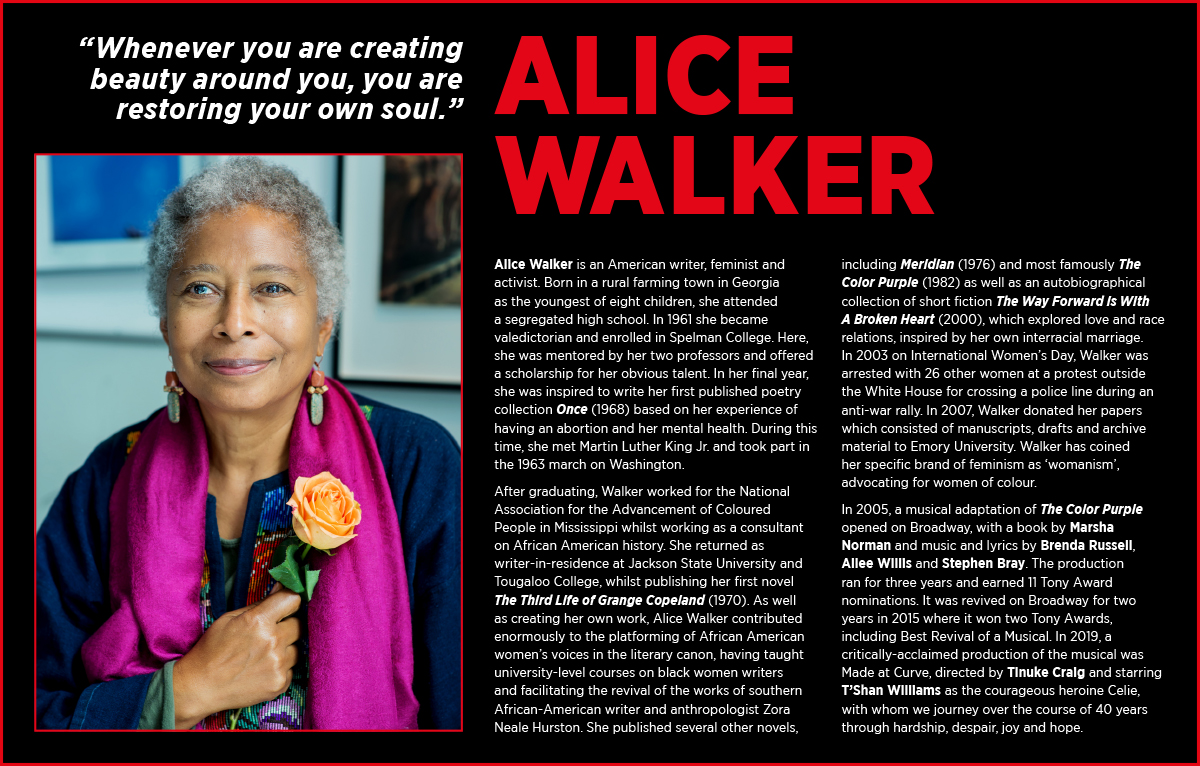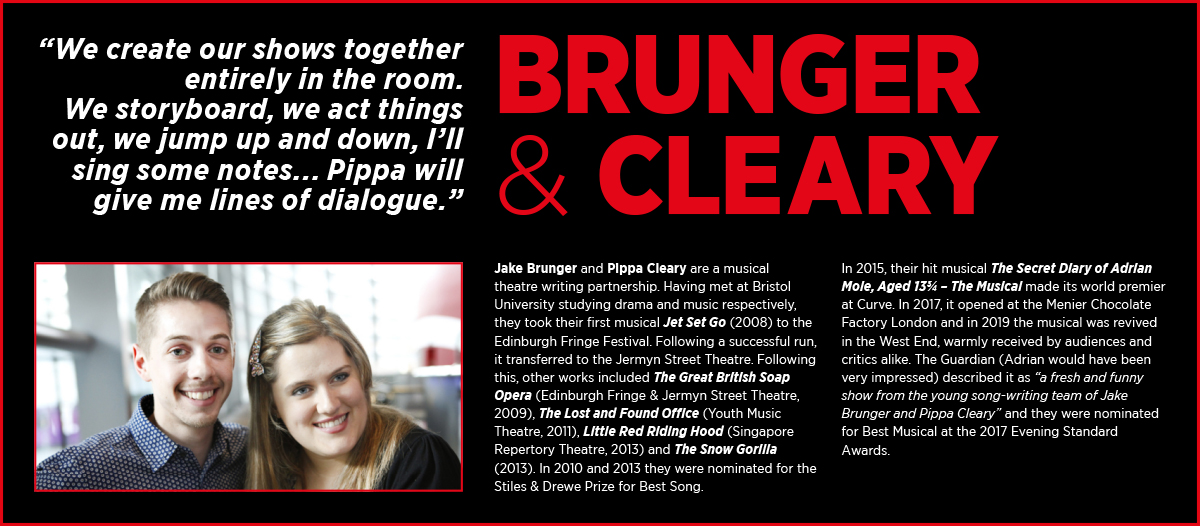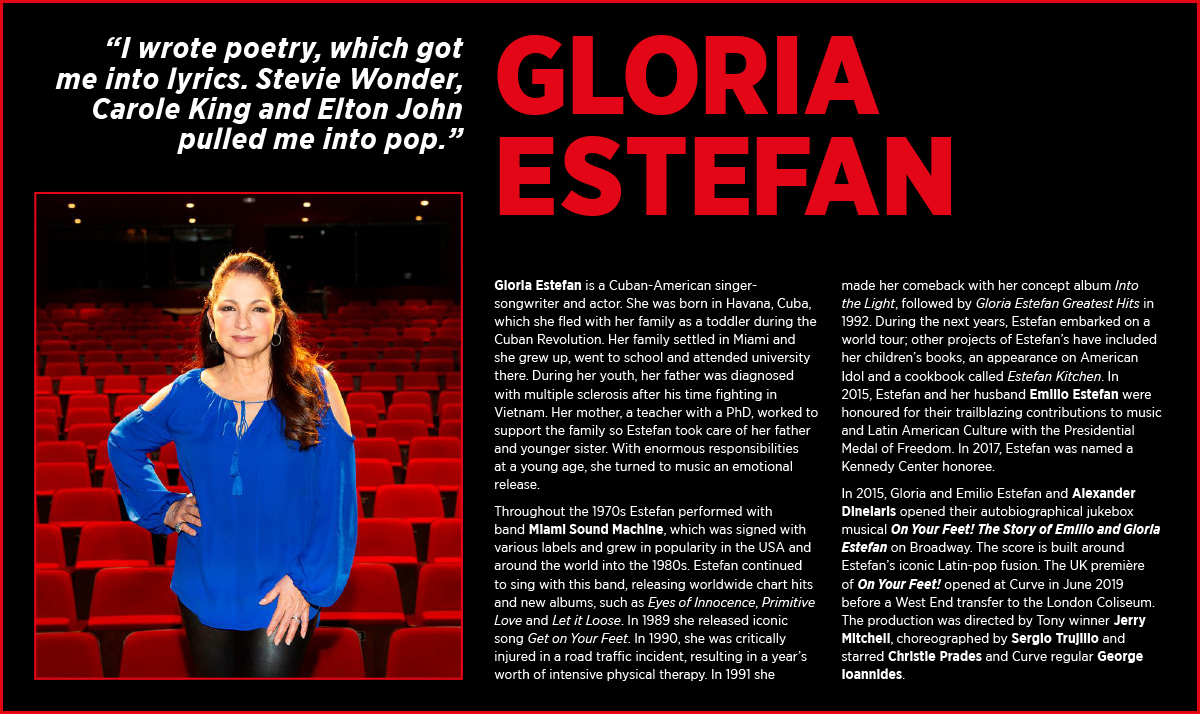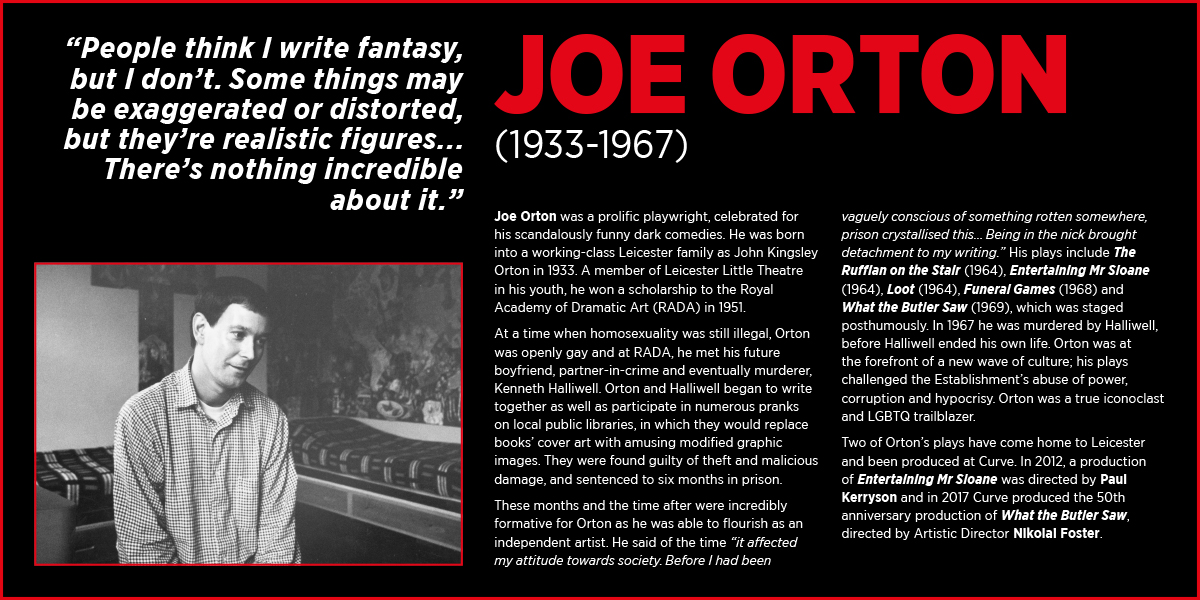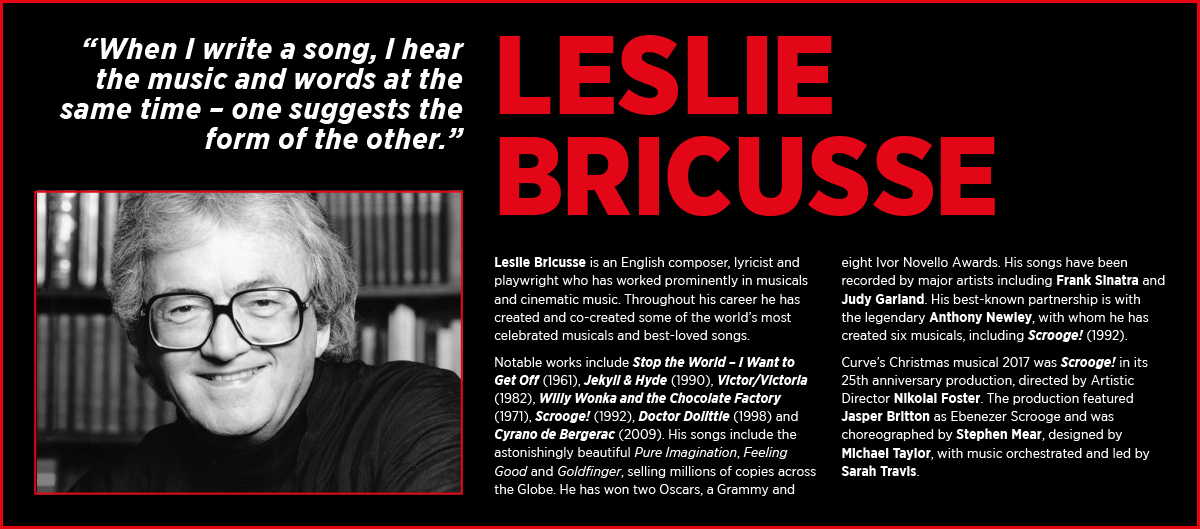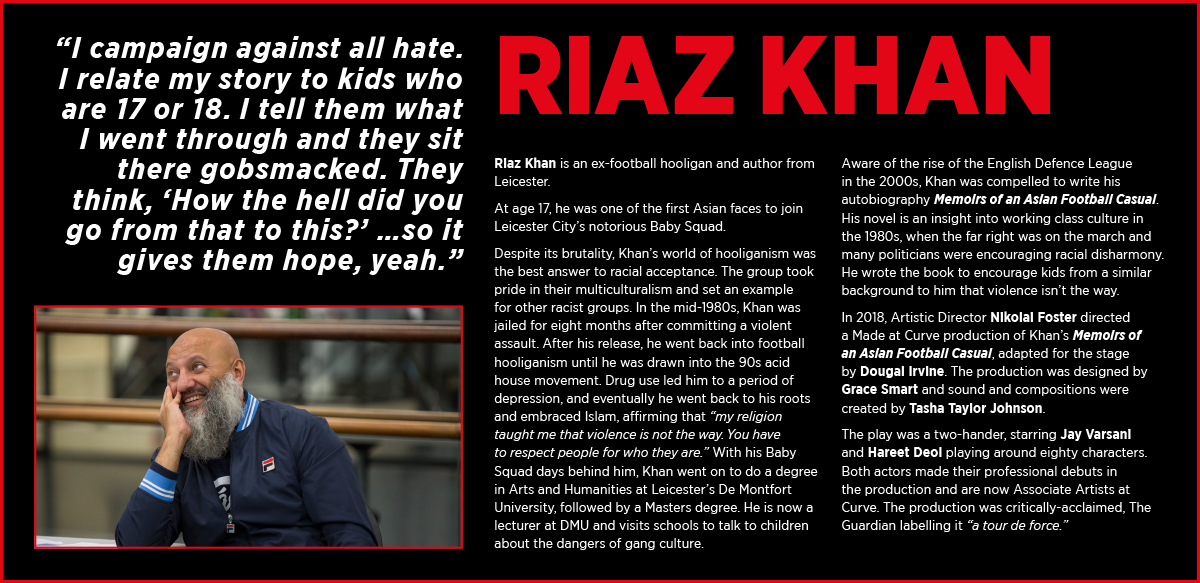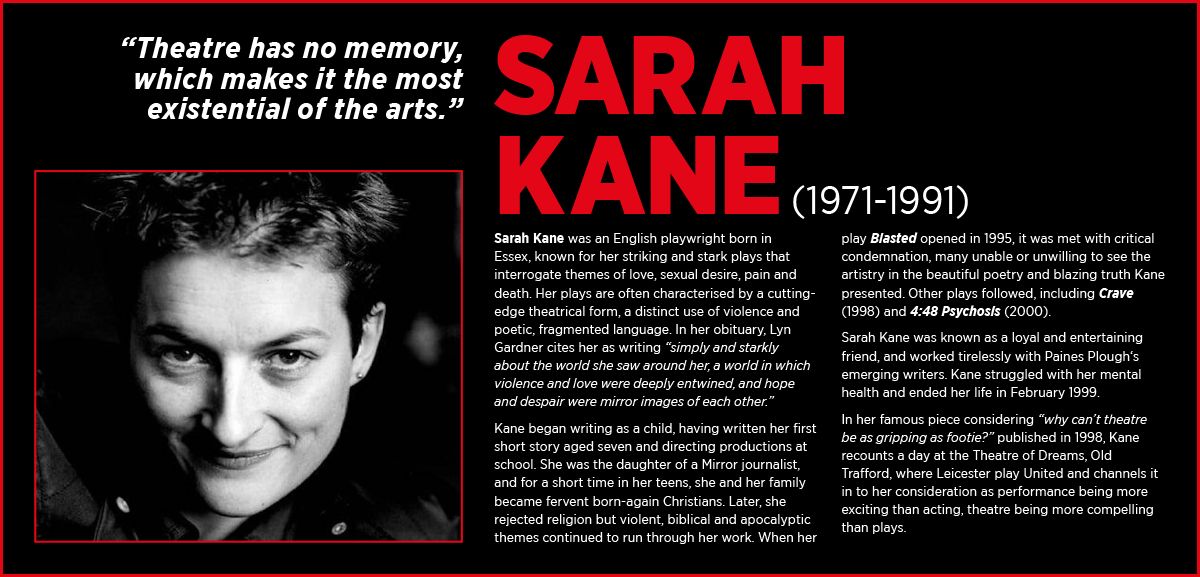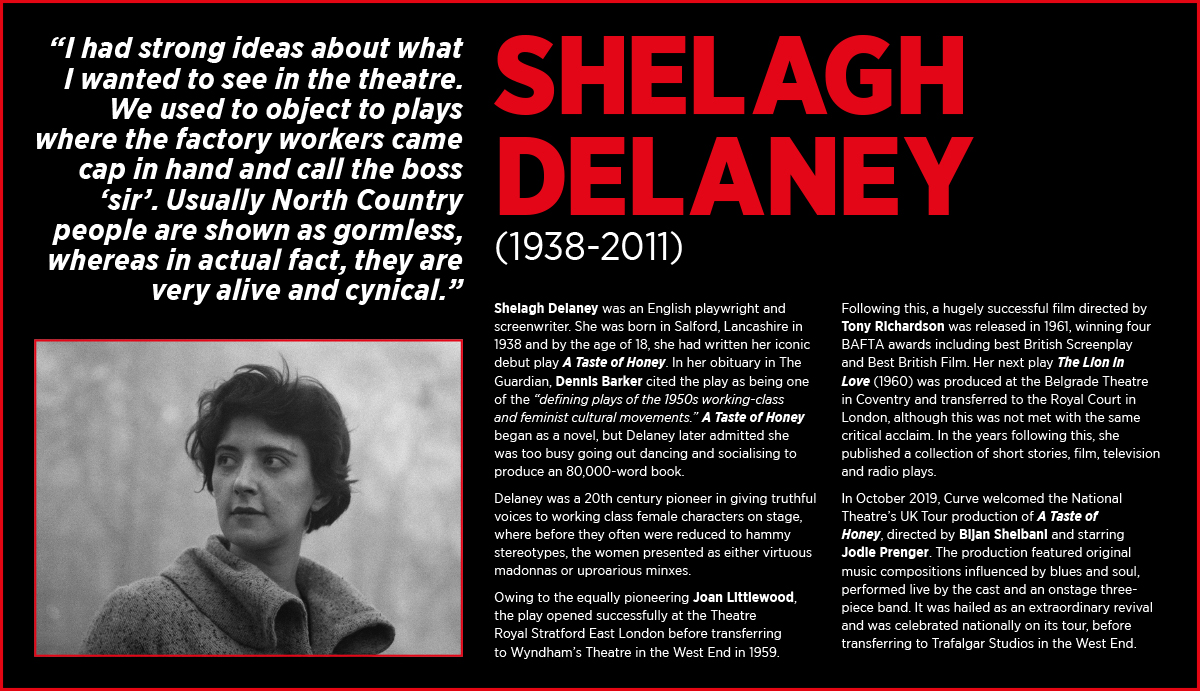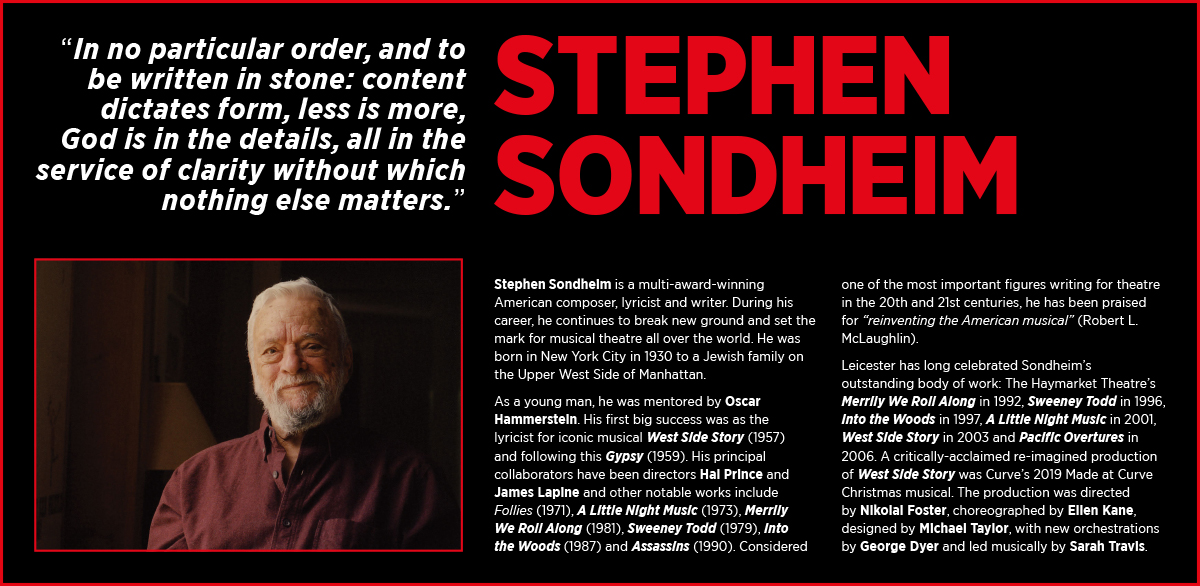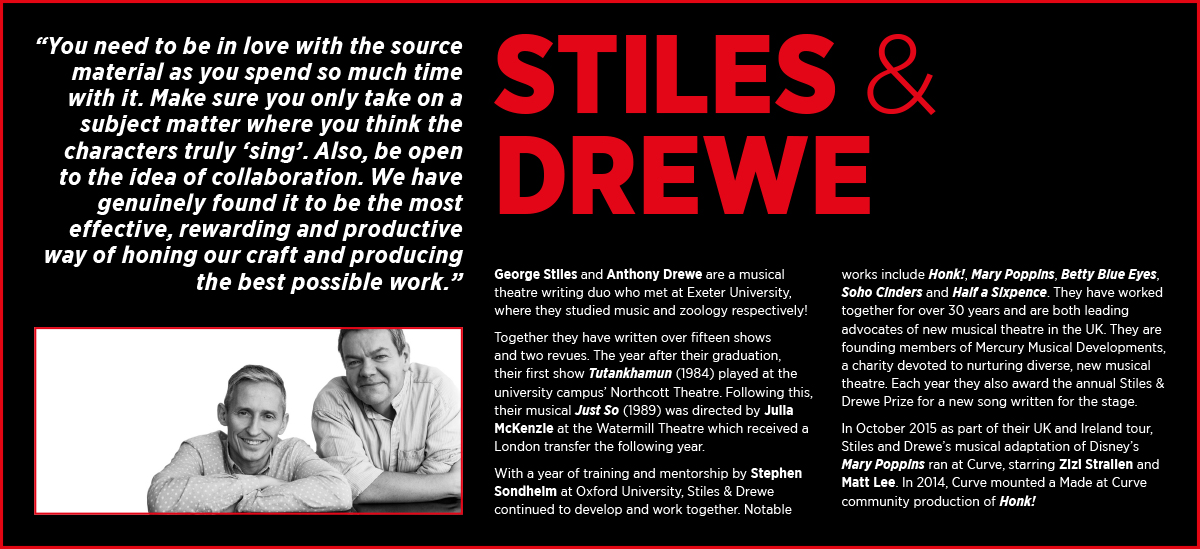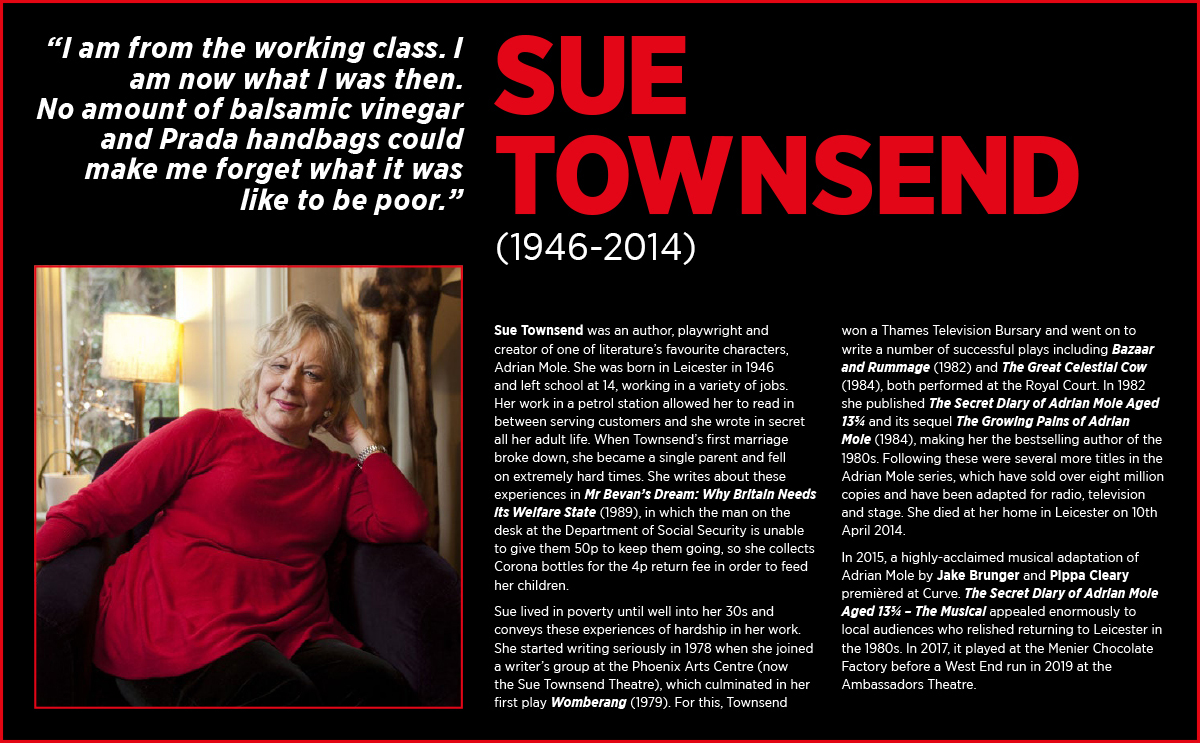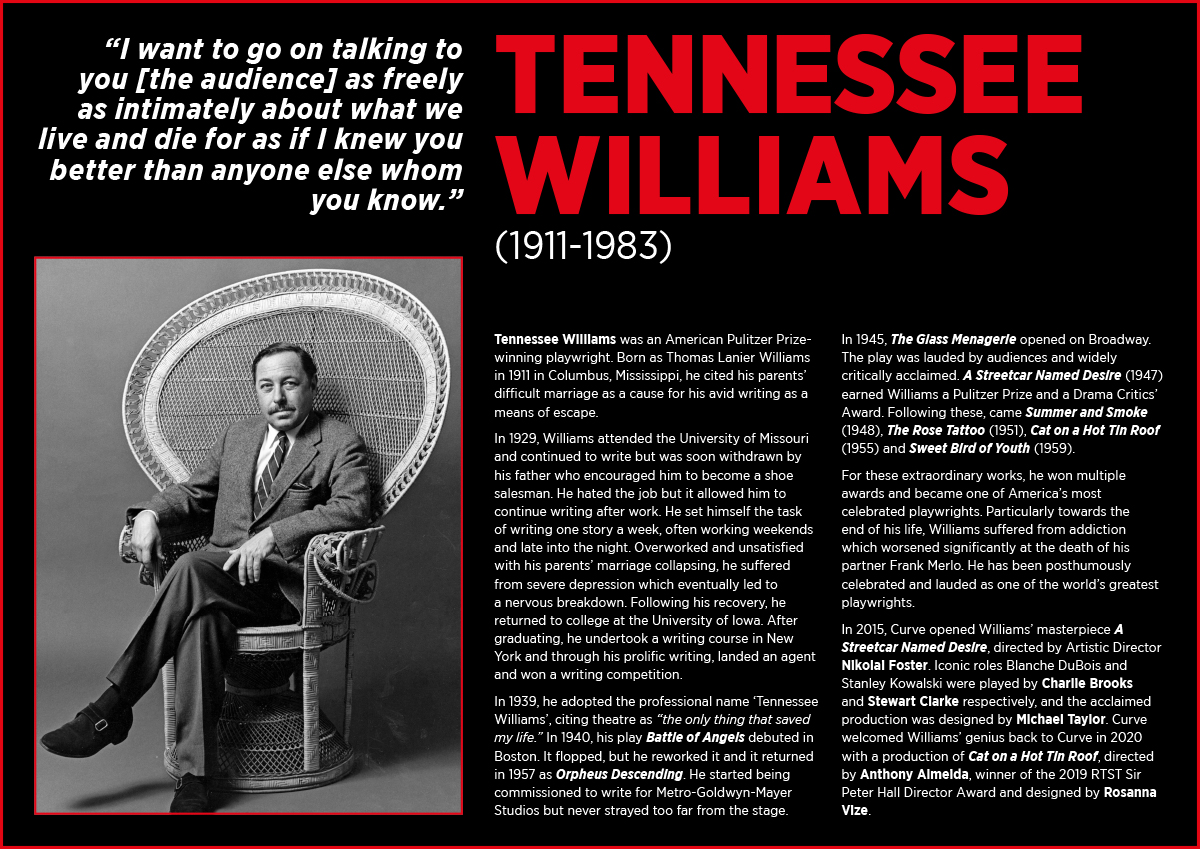Inside our Dressing Rooms

We’ve renamed our dressing rooms in honour of some incredible writers whose work is associated with our theatre. Inside each room there is a biography about the writer and a little bit about their connection to Curve. Scroll down to read about the writers and their connection to Curve.
Alice Walker
“Whenever you are creating beauty around you, you are restoring your own soul.”
Alice Walker is an American writer, feminist and activist. Born in a rural farming town in Georgia as the youngest of eight children, she attended a segregated high school. In 1961 she became valedictorian and enrolled in Spelman College. In her final year, she was inspired to write her first published poetry collection Once (1968) based on her experience of having an abortion and her mental health. During this time, she met Martin Luther King Jr. and took part in the 1963 march on Washington.
After graduating, Walker worked for the National Association for the Advancement of Coloured People in Mississippi whilst working as a consultant on African American history. She returned as writer-in-residence at Jackson State University and Tougaloo College, whilst publishing her first novel The Third Life of Grange Copeland (1970). As well as creating her own work, Alice Walker contributed enormously to the platforming of African American women’s voices in the literary canon, having taught university-level courses on black women writers and facilitating the revival of the works of southern African-American writer and anthropologist Zora Neale Hurtson.
She published several other novels including Merldlan (1976) and most famously The Color Purple (1982) as well as an autobiographical collection of short fiction The Way Forward Is With A Broken Heart (2000).
In 2005, a musical adaption of The Color Purple opened on Broadway, with a book by Marsha Norman and music and lyrics by Brenda Russell, Allee Wills and Stephen Bray. In 2019, a critically-acclaimed production of the musical was Made at Curve, directed by Tinuke Craig and starring T’Shan Williams as Celie.
Andrew Lloyd Webber
“I have always tried with my shows – win, lose or draw – to take the boundaries of music as far as I can.”
Lord Andrew Lloyd Webber is a British composer and musical theatre writer. He was born into a musical family, his father being a composer and organist and his mother a violinist and pianist. Lloyd Webber started composing at a young age, producing a suite of six pieces of music at nine. At age 17, Lloyd Webber met 20-year-old Tim Rice. The duo began to work on their first musical, The Likes of Us, a true story about Irish philanthropist Thomas John Barnardo. Following this, in the summer of 1967, a family friend of the Lloyd Webbers commissioned him and Rice to write a pop cantata based on the Old Testament. This resulted in the first iteration of Joseph and the Amazing Technicolour Dreamcoat. In 1969, Lloyd Webber and Rice’s song “Try it and See” was unsuccessful in being selected for the Eurovision Song Contest, so they put it into their next show Jesus Christ Superstar.
Many successful musicals followed, each one breaking boundaries and challenging what the musical can do – Evita (1978), Cats (1981), Starlight Express (1984) and The Phantom of the Opera (1986), Aspects of Love (1989) and Sunset Boulevard (1994), Whistle Down the Wind (1996), Stephen Ward (2013), The School of Rock (2015) & Cinderella (2020). Church music had been a large part of Lloyd Webber’s upbringing, and upon his father William’s death in 1982, he composed a Requiem Mass which first premiered at St. Thomas Church in New York in 1985. Having achieved great commercial, popular and critical success in musical theatre, Lloyd Webber was hailed in the New York Times as being “the most commercially successful composer in history”. Lloyd Webber continues to be a prominent figure on the British stage and television, with many revivals of his work continuing today. With his company the Really Useful Group, Lloyd Webber owns some of London’s best-loved theatres, including the Palladium, the Adelphi and Theatre Royal, Drury Lane.
Curve continues to work with the Andrew Lloyd Webber Foundation in outreach programmes as well as house and produce his celebrated classics. In 2017, Curve created an award-winning new production of Andrew’s Sunset Boulevard, which toured the UK and Ireland. The production was directed by artistic director Nikolai Foster and starred Danny Mac, Adam Pearce, Molly Lynch, Dougie Carter and Carl Sanderson. In 2020, Curve opened the UK and Ireland Tour of The Phantom of the Opera as well as the regional premier of Andrew’s Palladium version of The Wizard of Oz.
Brunger & Cleary
“We create our shows together entirely in the room. We storyboard, we act things out, we jump up and down, I’ll sing some notes…Pippa will give me lines of dialogue.”
Jake Brunger and Pippa Cleary are a musical theatre writing partnership. Having met at Bristol University studying drama and music respectively, they took their first musical Jet Set Go (2008) to the Edinburgh Fringe Festival. Following a successful run, it transferred to the Jermyn Street Theatre. Following this, other works included The Great British Soap Opera (Edinburgh Fringe & Jermyn Street Theatre, 2009), The Lost and Found Office (Youth Music Theatre, 2011), Little Red Riding Hood (Singapore Repertory Theatre, 2013) and The Snow Gorilla (2013). In 2010 and 2013 they were nominated for the Stiles & Drewe Prize for Best Song.
In 2015, their hit musical The Secret Diary of Adrian Mole, Aged 13 ¾ made its world premier at Curve. In 2017, it opened at the Menier Chocolate Factory London and in 2019 the musical was revived in the West End, warmly received by audiences and critics alike. The Guardian (Adrian would have been very impressed) described it as “a fresh and funny show from the young song-writing team of Jake Brunger and Pippa Cleary” and they were nominated for Best Musical at the 2017 Evening Standard Awards.
Gloria Estefan
“I wrote poetry, which got me into lyrics. Stevie Wonder, Carole King and Elton John pulled me into pop.”
Gloria Estefan is a Cuban-American singer-songwriter and actor. She was born in Havana, Cuba, which she fled with her family as a toddler during the Cuban Revolution. Her family settled in Miami and she grew up, went to school and attended university there. During her youth, her father was diagnosed with multiple sclerosis after his time fighting in Vietnam. Her mother, a teacher with a PhD, worked to support the family so Estefan took care of her father and younger sister. With enormous responsibilities at a young age, she turned to music an emotional release.
Throughout the 1970s Estefan performed with band Miami Sound Machine, which was signed with various labels and grew in popularity in the USA and around the world into the 1980s. Estefan continued to sing with this band, releasing worldwide chart hits and new albums, such as Eyes of Innocence, Primitive Love and Let it Loose. In 1989 she released iconic song ‘Get on Your Feet’. In 1990, she was critically injured in a road traffic incident, resulting in a year’s worth of intensive physical therapy. In 1991 she made her comeback with her concept album Into the Light, followed by Gloria Estefan Greatest Hits in 1992. During the next years, Estefan embarked on a world tour; other projects of Estefan’s have included her children’s books, an appearance on American Idol and a cookbook called Estefan Kitchen. In 2015, Estefan and her husband Emilio Estefan were honoured for their trailblazing contributions to music and Latin American Culture with the Presidential Medal of Freedom. In 2017, Estefan was named a Kennedy Center honoree.
In 2015, Gloria and Emilio Estefan and Alexander Dinelaris opened their autobiographical jukebox musical On Your Feet! The Story of Emilio and Gloria Estefan on Broadway. The score is built around Estefan’s iconic Latin-pop fusion. The UK première of On Your Feet! opened at Curve in June 2019 before a West End transfer to the London Coliseum. The production was directed by Tony winner Jerry Mitchell, choreographed by Sergio Trujillo and starred Christie Prades and Curve regular George Ioannides.
Joe Orton (1933-1967)
Joe Orton was a prolific playwright celebrated for his scandalously funny dark comedies. He was born into a working-class Leicester family as John Kingsley Orton in 1933. A member of Leicester Little Theatre in his youth, he won a scholarship to the Royal Academy of Dramatic Art (RADA) in 1951. At a time when homosexuality was still illegal, Orton was openly gay and at RADA, he met his future boyfriend, partner-in-crime and eventually murderer, Kenneth Halliwell. Orton and Halliwell began to write together as well as participate in numerous pranks on local public libraries, in which they would replace books’ cover art with amusing modified graphic images. They were found guilty of theft and malicious damage, and sentenced to six months in prison.
These months and the time after were incredibly formative for Orton as he was able to flourish as an independent artist. He said of the time “it affected my attitude towards society. Before I had been vaguely conscious of something rotten somewhere, prison crystallised this… Being in the nick brought detachment to my writing.” His plays include The Ruffian on the Stair (1964), Entertaining Mr Sloane (1964), Loot (1964), Funeral Games (1968) and What the Butler Saw (1969), which was staged posthumously. In 1967 he was murdered by Halliwell, before Halliwell ended his own life. Orton was at the forefront of a new wave of culture; his plays challenged the Establishment’s abuse of power, corruption and hypocrisy. Orton was a true iconoclast and LGBTQ trailblazer.
Two of Orton’s plays have come home to Leicester and been produced at Curve. In 2012, a production of Entertaining Mr Sloane was directed by Paul Kerryson and in 2017 Curve produced the 50th anniversary production of What the Butler Saw, directed by Artistic Director Nikolai Foster.
Leslie Bricusse
“When I write a song, I hear the music and words at the same time – one suggests the form of the other.”
Leslie Bricusse is an English composer, lyricist and playwright who has worked prominently in musicals and cinematic music. Throughout his career he has created and co-created some of the world’s most celebrated musicals and best-loved songs.
Notable works include Stop the World – I Want to Get Off (1961), Jekyll and Hyde (1990), Victor/Victoria (1982), Willy Wonka and the Chocolate Factory (1971), Scrooge (1992), Doctor Dolittle (1998) and Cyrano de Bergerac (2009). His songs include the astonishingly beautiful “Pure Imagination”, “Feeling Good” and “Goldfinger”, selling millions of copies across the Globe. He has won two Oscars, a Grammy and eight Ivor Novello Awards. His songs have been recorded by major artists including Frank Sinatra and Judy Garland. His best-known partnership is with the legendary Anthony Newley, with whom he has created six musicals, including Scrooge (1992).
Curve’s Christmas musical 2017 was Scrooge in its 25th anniversary production, directed by Artistic Director Nikolai Foster. The production featured Jasper Britton as Ebenezer Scrooge and was choreographed by Stephen Mear, designed by Michael Taylor, with music orchestrated and led by Sarah Travis.
Riaz Khan
“I campaign against all hate. I relate my story to kids who are 17 or 18. I tell them what I went through and they sit there gobsmacked. They think, ‘How the hell did you go from that to this?’ …so it gives them hope, yeah.”
Riaz Khan is an ex-football hooligan and author from Leicester.
At age 17, he was one of the first Asian faces to join Leicester City’s notorious Baby Squad.
Despite its brutality, Khan’s world of hooliganism was the best answer to racial acceptance. The group took pride in their multiculturalism and set an example for other racist groups. In the mid-1980s, Khan was jailed for eight months after committing a violent assault. After his release, he went back into football hooliganism until he was drawn into the 90s acid house movement. Drug use led him to a period of depression, and eventually he went back to his roots and embraced Islam, affirming that “my religion taught me that violence is not the way. You have to respect people for who they are.” With his Baby Squad days behind him, Khan went on to do a degree in Arts and Humanities at Leicester’s De Montfort University, followed by a Masters degree. He is now a lecturer at DMU and visits schools to talk to children about the dangers of gang culture.
Aware of the rise of the English Defence League in the 2000s, Khan was compelled to write his autobiography Memoirs of an Asian Football Casual. His novel is an insight into working class culture in the 1980s, when the far right was on the march and many politicians were encouraging racial disharmony. He wrote the book to encourage kids from a similar background to him that violence isn’t the way.
In 2018, Artistic Director Nikolai Foster directed a Made at Curve production of Khan’s Memoirs of an Asian Football Casual, adapted for the stage by Dougal Irvine. The production was designed by Grace Smart and sound and compositions were created by Tasha Taylor Johnson.
The play was a two-hander, starring Jay Varsani and Hareet Deol playing around eighty characters. Both actors made their professional debuts in the production and are now Associate Artists at Curve. The production was critically-acclaimed, The Guardian labelling it “a tour de force.”
Sarah Kane
“Theatre has no memory, which makes it the most existential of the arts.”
Sarah Kane was an English playwright born in Essex, known for her striking and stark plays that interrogate themes of love, sexual desire, pain and death. Her plays are often characterised by a cutting-edge theatrical form, a distinct use of violence and poetic, fragmented language. In her obituary, Lyn Gardner cites her as writing “simply and starkly about the world she saw around her, a world in which violence and love were deeply entwined, and hope and despair were mirror images of each other.”
Kane began writing as a child, having written her first short story aged seven and directing productions at school. She was the daughter of a Mirror journalist, and for a short time in her teens, she and her family became fervent born-again Christians. Later, she rejected religion but violent, biblical and apocalyptic themes continued to run through her work. When her play Blasted opened in 1995, the play was met with critical condemnation, many unable or unwilling to see the artistry in the beautiful poetry and stark truth Kane presented. Other plays followed, including Crave (1998) 4:48 Psychosis (2000).
Sarah Kane was known as a loyal and entertaining friend, and worked tirelessly and generously at theatre company Paines Plough with emerging writers. Kane struggled with her mental health and ended her life in February 1999.
In her famous piece considering “why can’t theatre be as gripping as footie?” published in 1998, Kane recounts a day at the Theatre of Dreams, Old Trafford, where Leicester play United and channels it in to her consideration as performance being more exciting than acting, theatre being more compelling than plays.
Shelagh Delaney (1938-2011)
“I had strong ideas about what I wanted to see in the theatre. We used to object to plays where the factory workers came cap in hand and call the boss ‘sir’. Usually North Country people are shown as gormless, whereas in actual fact, they are very alive and cynical.”
Shelagh Delaney was an English playwright and screenwriter. She was born in Salford, Lancashire in 1938 and by the age of 18, she had written her iconic debut play A Taste of Honey. In her obituary in The Guardian, Dennis Barker cited the play as being one of the “defining plays of the 1950s working-class and feminist cultural movements”. A Taste of Honey began as a novel, but Delaney later admitted she was too busy going out dancing and socialising to produce an 80,000-word book. Delaney was a 20th century pioneer in giving truthful voices to working class female characters on stage, where before they often were reduced to hammy stereotypes, the women presented as either virtuous madonnas or uproarious minxes. Owing to the equally pioneering Joan Littlewood, the play opened successfully at the Theatre Royal Stratford East London before transferring to Wyndham’s theatre in the West End in 1959. Following this, a hugely successful film directed by Tony Richardson was released in 1961, winning four BAFTA awards including best British Screenplay and Best British Film. Her next play The Lion in Love (1960) was produced at the Belgrade Theatre in Coventry and transferred to the Royal Court in London, although this was not met with the same critical acclaim. In the years following this, she published a collection of short stories, film, television and radio plays.
In October 2019, Curve housed the National Theatre’s UK Tour production of A Taste of Honey, directed by Bijan Sheibani and starring Jodie Prenger. The production featured original music compositions influenced by blues and soul, performed live by the cast and an onstage three-piece band. It was hailed as an extraordinary revival and was celebrated nationally on its tour, before transferring to Trafalgar Studios in the West End.
Stephen Sondheim
“In no particular order, and to be written in stone: content dictates form, less is more, God is in the details, all in the service of clarity without which nothing else matters.”
Stephen Sondheim is a multi-award-winning American composer, lyricist and writer. During his long-spanning career, he has continued to break new ground and set the mark for musical theatre all over the world. He was born in New York City in 1930 to a Jewish family on the Upper West Side of Manhattan.
As a young man, he was mentored by Oscar Hammerstein. His first big success was as the lyricist for iconic musical West Side Story (1957) and following this Gypsy (1959). His principal collaborators have been director Hal Prince and James Lapine and other notable works include Follies (1971), A Little Night Music (1973), Merrily We Roll Along (1981), Sweeney Todd (1979), Into the Woods (1987) and Assassins (1990). Considered one of the most important figures writing for theatre in the 20th and 21st centuries, he has been praised for “reinventing the American musical” (Robert L. McLaughlin).
Leicester has long celebrated Sondheim’s outstanding body of work: The Haymarket Theatre Merrily We Roll Along in 1992, Sweeney Todd in 1996, Into the Woods in 1997, A Little Night Music in 2001, West Side Story in 2003 and Pacific Overtures in 2006. A critically-acclaimed re-imagined production of West Side Story was Curve’s 2019 Made at Curve Christmas musical. The production was directed by Curve’s Artistic Director Nikolai Foster, choreographed by Ellen Kane, designed by Michael Taylor, with new orchestrations by George Dyer and led musically by Sarah Travis.
Stiles and Drewe
“You need to be in love with the source material as you spend so much time with it. Make sure you only take on a subject matter where you think the characters truly “sing”. Also, be open to the idea of collaboration. We have genuinely found it to be the most effective, rewarding and productive way of honing our craft and producing the best possible work.”
George Stiles and Anthony Drewe are a musical theatre writing duo who met at Exeter University, where they studied music and zoology respectively!
Together they have written over fifteen shows and two revues. The year after their graduation, their first show Tutankhamun (1984) played at the university campus’ Northcott Theatre. Following this, their musical Just So (1989) was directed by Julia McKenzie at the Watermill Theatre which received a London transfer the following year.
With a year of training and mentorship by Stephen Sondheim at Oxford University, Stiles and Drewe continued to develop and work together. Notable works include Honk!, Mary Poppins, Betty Blue Eyes, Soho Cinders and Half a Sixpence. They have worked together for over 30 years and are both leading advocates of new musical theatre in the UK. They are founding members of Mercury Musical Developments, a charity devoted to nurturing diverse, new musical theatre. Each year they also award the annual Stiles and Drewe Prize for a new song written for the stage.
In October 2015 as part of their UK and Ireland tour, Stiles and Drewe’s musical adaptation of Disney’s Mary Poppins ran at Curve, starring Zizi Strallen and Matt Lee. In 2014, Curve mounted a Made at Curve community production of Honk!.
Sue Townsend (1946-2014)
“I am from the working class. I am now what I was then. No amount of balsamic vinegar and Prada handbags could make me forget what it was like to be poor.”
Sue Townsend was an author, playwright and creator of one of literature’s favourite characters, Adrian Mole. She was born in Leicester in 1946 and left school at 14, working in a variety of jobs. Her work in a petrol station allowed her to read in between serving customers and she wrote in secret all her adult life. When Townsend’s first marriage broke down, she became a single parent and fell on extremely hard times. She writes about these experiences in Mr Bevan’s Dream: Why Britain Needs its Welfare State (1989), in which the man on the desk at the Department of Social Security is unable to give them 50p to keep them going, so she collects Corona bottles for the 4p return fee in order to feed her children.
Sue lived in poverty until well into her 30s and conveys these experiences of hardship in her work. She started writing seriously in 1978 when she joined a writer’s group at the Phoenix Arts Centre (now the Sue Townsend Theatre), which culminated in her first play Womberang (1979). For this, Townsend won a Thames Television Bursary and went on to write a number of successful plays including Bazaar and Rummage (1982) and The Great Celestial Cow (1984), both performed at the Royal Court. In 1982 she published The Secret Diary of Adrian Mole aged 13 ¾ and its sequel The Growing Pains of Adrian Mole (1984) which made her the bestselling author of the 1980s. Following these were several more titles in the Adrian Mole series, which have sold over eight million copies and have been adapted for radio, television and stage. She died at her home in Leicester on 10th April 2014.
In 2015, a highly-acclaimed musical adaptation of Adrian Mole by Jake Brunger and Pippa Cleary premièred at Curve. The Secret Diary of Adrian Mole Aged 13 3/4 The Musical appealed enormously to local audiences who relished returning to Leicester in the 1980s. In 2017, it returned to the Menier Chocolate Factory before a West End run in 2019 at the Ambassadors Theatre. A revival of Great Celestial Cow has also been presented at Curve.
Tennessee Williams
“I want to go on talking to you [the audience] as freely as intimately about what we live and die for as if I knew you better than anyone else whom you know.”
Tennessee Williams was an American Pulitzer Prize-winning playwright. Born as Thomas Lanier Williams in 1911 in Columbus, Mississippi, he cited his parents’ difficult marriage as a cause for his avid writing as a means of escape.
In 1929, Williams attended the University of Missouri and continued to write but was soon withdrawn by his father who encouraged him to become a shoe salesman. He hated the job but it allowed him to continue writing after work. He set himself the task of writing one story a week, often working weekends and late into the night. Overworked and unsatisfied with his parents’ marriage collapsing, he suffered from severe depression which eventually led to a nervous breakdown. Following his recovery, he returned to college at the University of Iowa. After graduating, he undertook a writing course in New York and through his prolific writing, landed an agent and won a writing competition.
In 1939, he adopted the professional name ‘Tennessee Williams’, citing theatre as “the only thing that saved my life.” In 1940, his play Battle of Angels debuted in Boston. It flopped, but he reworked it and it returned in 1957 as Orpheus Descending. He started being commissioned to write for Metro-Goldwyn-Mayer Studios but never strayed too far from the stage.
In 1945, The Glass Menagerie opened on Broadway. The play was lauded by audiences and widely critically acclaimed. A Streetcar Named Desire (1947) earned Williams a Pulitzer Prize and a Drama Critics’ Award. Following these, came Summer and Smoke (1948), The Rose Tattoo (1951), Cat on a Hot Tin Roof (1955) and Sweet Bird of Youth (1959).
For these extraordinary works, he won multiple awards and became one of America’s most celebrated playwrights. Particularly towards the end of his life, Williams suffered from addiction which worsened significantly at the death of his partner Frank Merlo. He has been posthumously celebrated and lauded as one of the world’s greatest playwrights.
In 2015, Curve opened Williams’ masterpiece A Streetcar Named Desire, directed by Artistic Director Nikolai Foster. Iconic roles Blanche DuBois and Stanley Kowalski were played by Charlie Brooks and Stewart Clarke respectively, and the acclaimed production was designed by Michael Taylor. Curve welcomed Williams’ genius back to Curve in 2020 with a production of Cat on a Hot Tin Roof, directed by Anthony Almeida, winner of the 2019 RTST Sir Peter Hall Director Award and designed by Rosanna Vize.
